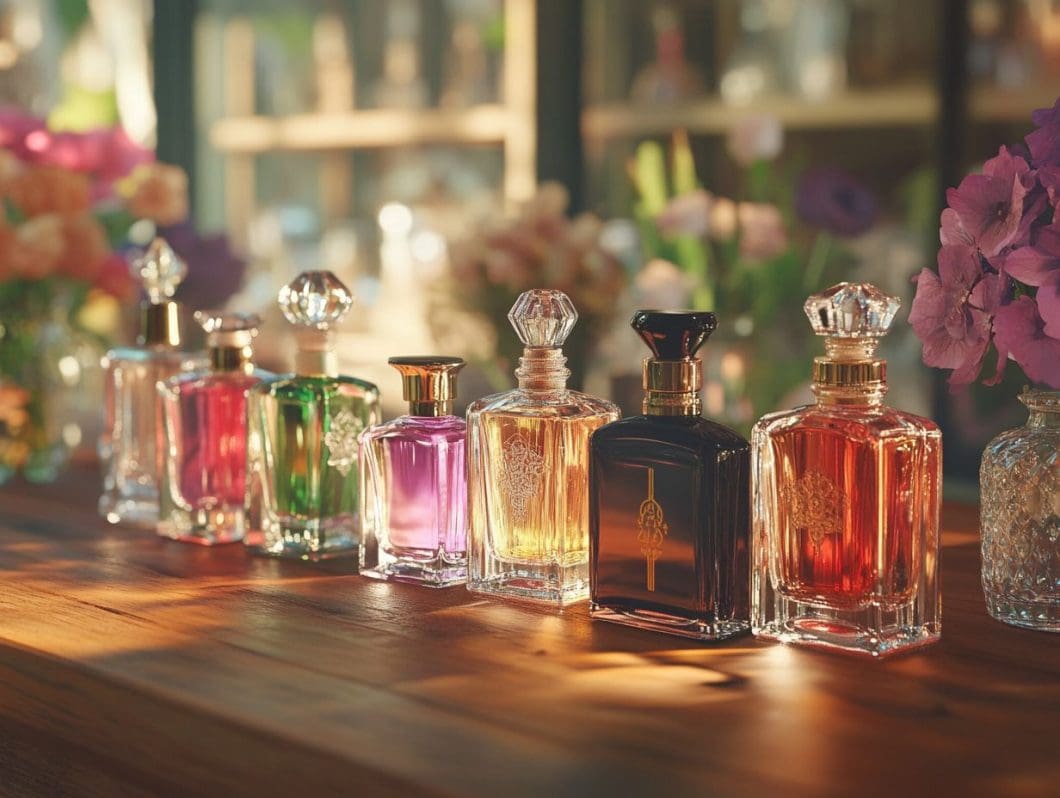Choosing the right perfume is more than just a matter of personal taste; it can significantly influence your mood and the impressions you leave on others.
With various notes, strengths, and types available, navigating the fragrance world can feel overwhelming.
This guide will help you understand perfume notes, consider personal preferences and skin chemistry, and select the perfect scent for any occasion.
Whether you’re shopping for yourself or a gift, you’ll find tips to help you make a decision.
Key Takeaways:
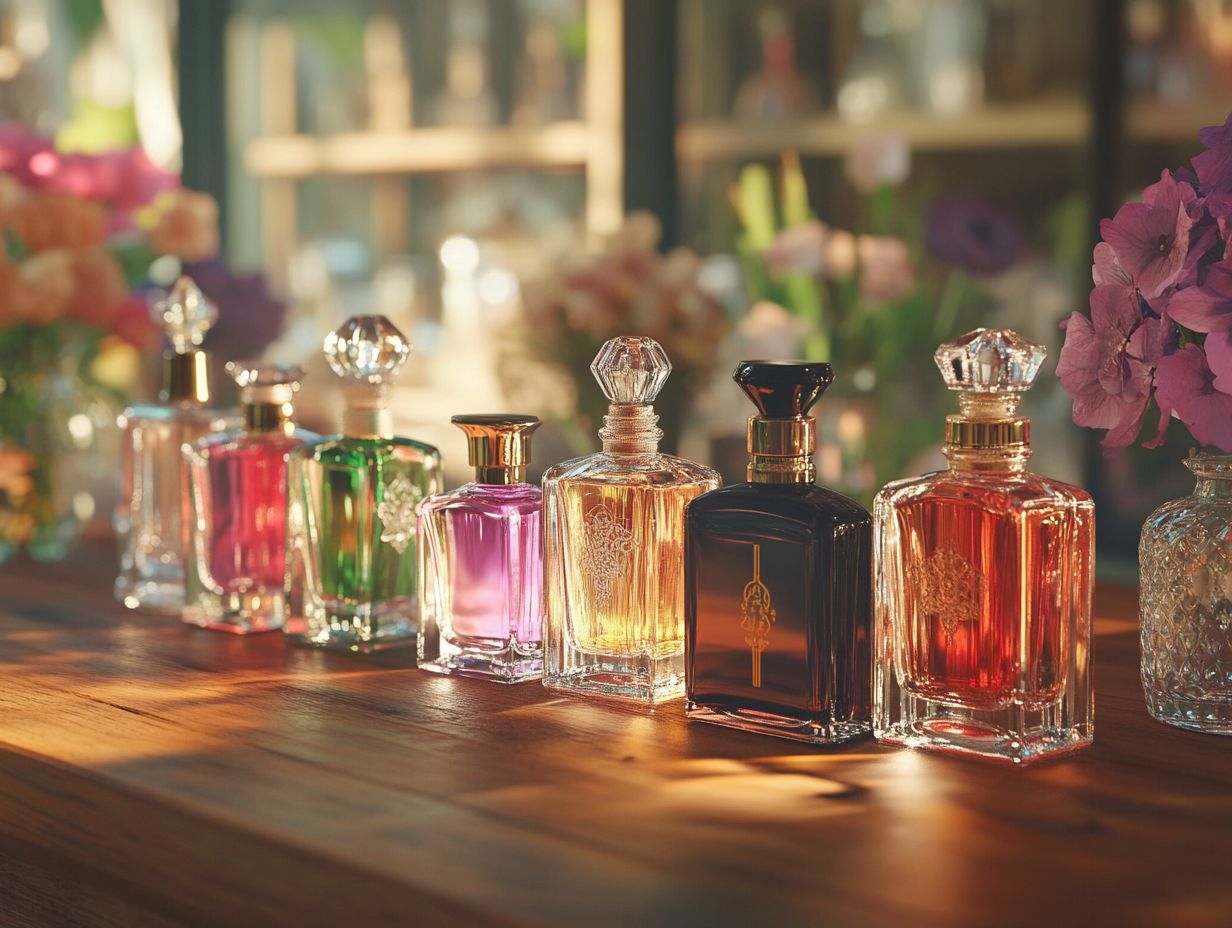
- Choose the right perfume for the occasion by considering your personal preferences, skin chemistry, and the season.
- Understand the different types of perfumes and their strengths to find the perfect scent that suits your needs.
- Properly test and choose a perfume by understanding the notes, which can affect mood and make a lasting impression.
The Importance of Choosing the Right Perfume
Selecting the appropriate perfume is vital for creating a lasting impression, as it not only represents one’s unique style but also affects how others perceive an individual in various social contexts, ranging from job interviews to romantic engagements.
The ideal fragrance can significantly boost confidence and enhance one’s presence, underscoring the importance of understanding the nuances of perfume selection. A well-chosen scent possesses the ability to evoke emotions and memories, and it can even influence mood, making it an essential consideration in daily life.
How Scent Can Affect Mood and Impressions
The selection of fragrance can significantly impact one’s mood and the impressions formed on others, as the olfactory sense is intricately connected to emotions and memories.
When individuals cultivate an environment infused with floral scents, they often experience heightened feelings of relaxation and nostalgia. This emotional state can enhance social interactions, rendering them more approachable and receptive.
Conversely, invigorating scents, such as citrus or ocean breezes, tend to energize individuals, providing a revitalizing boost that can contribute to a more positive atmosphere.
Warm, spicy fragrances, such as cinnamon or vanilla, evoke sensations of comfort and security, thereby facilitating the development of intimate connections.
By recognizing how these various aromas influence emotional responses and interpersonal relationships, individuals can select scents that not only elevate their own mood but also foster positive impressions in social contexts.
Understanding Perfume Notes
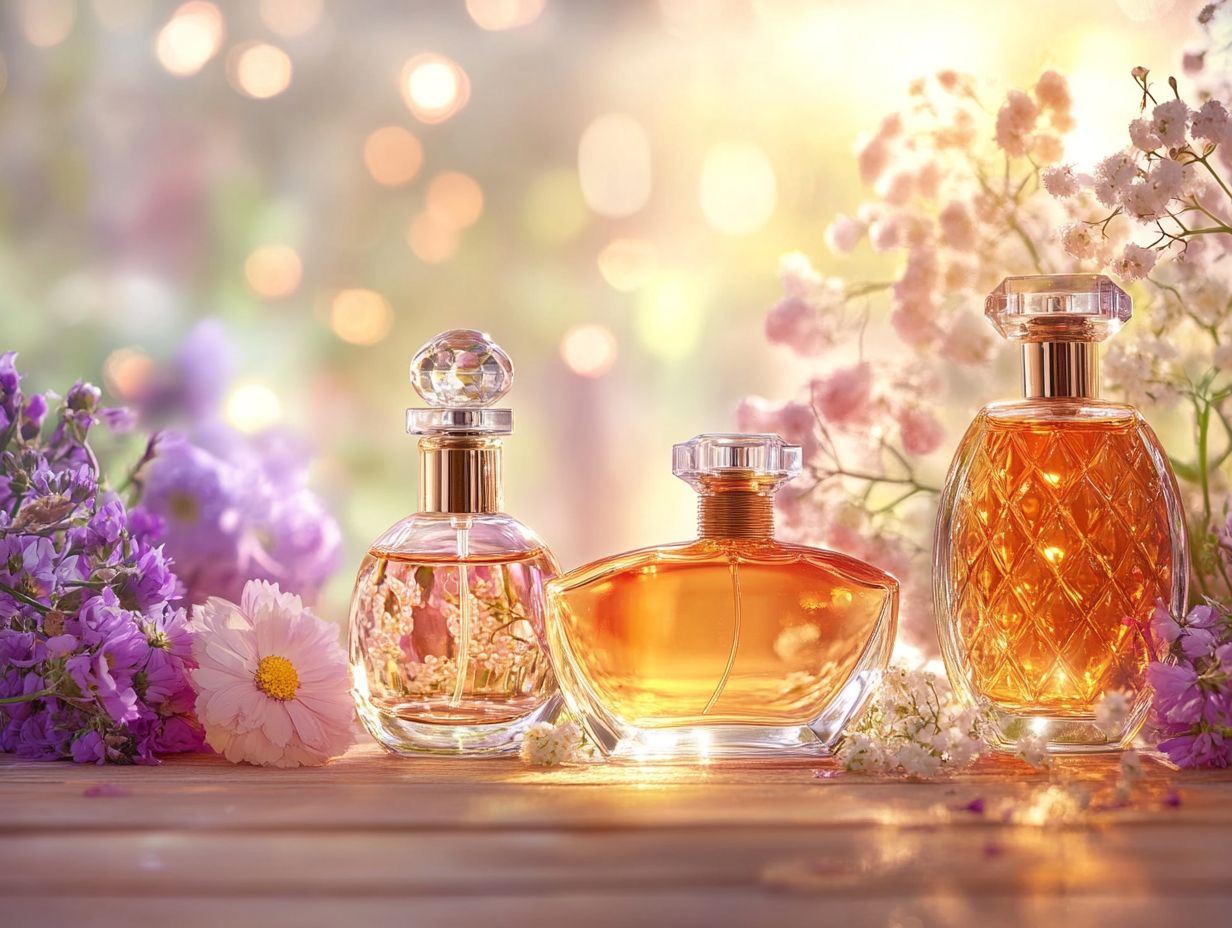
Comprehending perfume notes is essential in one’s fragrance journey, as they dictate the evolution of a scent over time.
Fragrances consist of top notes that form the initial impression, middle notes that emerge as the top notes dissipate, and base notes that contribute to the longevity and depth of the scent.
Top, Middle, and Base Notes Explained
Top notes are the initial scents that one perceives, often characterized by bright and fresh qualities, while middle notes develop as the fragrance settles, ultimately leading to the deeper and more enduring base notes.
These initial scents, which may include citrus or light floral notes, create an immediate impression, making fragrances such as the vibrant lemon and bergamot in Chanel No. 5 particularly captivating from the outset.
As the perfume evolves, the middle notes emerge, presenting a heartwarming floral bouquet or spicy undertones that exemplify the essence of the fragrance. For example, Clinique’s Happy features a delightful blend of vibrant flowers and sweet blossoms during this stage, enhancing the overall experience prior to the transition into the base notes.
These lasting scents, often composed of warm woods, musk, or amber, provide a prolonged impression that lingers on the skin, effectively balancing the entire olfactory journey.
Factors to Consider When Choosing a Perfume
When selecting a perfume, it is essential to consider various factors, including individual skin chemistry, personal preferences, and the specific occasion, whether it be a casual daytime event or a formal gathering.
Additionally, seasonal variations may also impact the perception of a scent.
Personal Preferences and Skin Chemistry
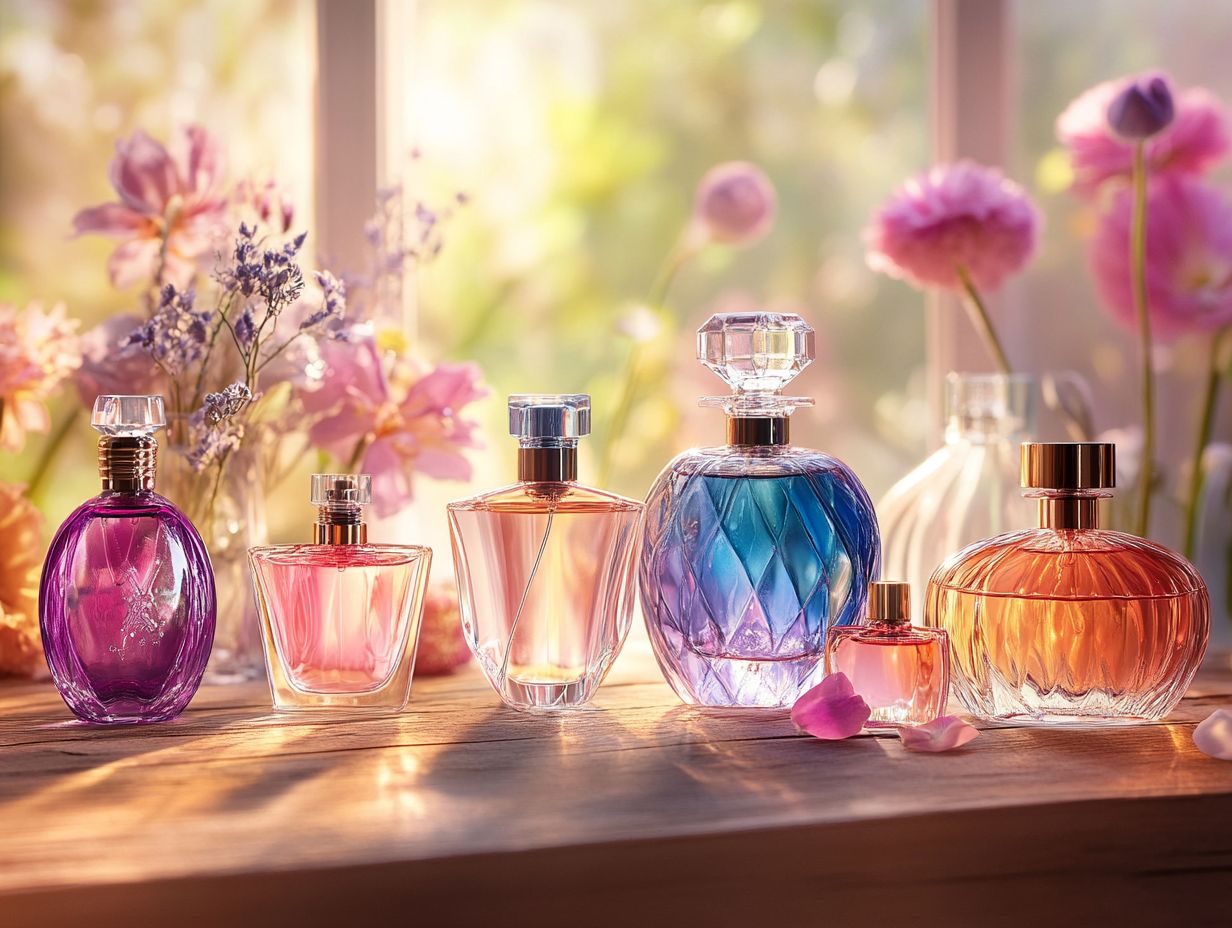
Personal preferences and skin chemistry are critical factors in the selection of a perfume, as a scent that is exquisite on one individual may not yield the same impression on another due to variations in body chemistry.
Elements such as skin type, diet, and hormonal fluctuations significantly influence the way a fragrance evolves over time. For example, individuals with oily skin typically experience enhanced scent longevity and a more pronounced amplification of certain notes, while those with dry skin may find that fragrances diminish more rapidly, altering their intended scent profile.
Additionally, dietary choices can impact natural body scent; a diet rich in spices may contribute warmth and depth to a fragrance, whereas a more neutral diet may result in a softer aromatic experience.
Hormonal changes, particularly those occurring at various life stages, can also unexpectedly influence scent preferences and perceptions. Therefore, it is essential to consider these factors when curating a personal olfactory style.
Occasion and Season
The selection of a perfume is significantly influenced by the occasion and season, as certain scents are more suitable for specific times of the year or events. For example, light floral fragrances are often preferred in the summer, while warm, spicy scents are typically chosen for winter formal occasions.
In professional settings such as job interviews, where first impressions are paramount, a subtle and sophisticated fragrance can foster confidence without being overwhelming. Conversely, for an evening out or a first date, a more alluring and sensual scent may create the desired atmosphere.
Additionally, during the fresh and vibrant days of spring, refreshing citrus notes can elevate one’s spirits, whereas autumn often calls for deeper, earthier undertones. Selecting fragrances that align with various activities not only enhances the overall experience but also complements an individual’s personality, allowing them to feel more attuned and present in each moment.
Types of Perfumes and Their Strengths
A thorough understanding of the various types of perfumes, including Eau de Parfum, Eau de Toilette, and Eau de Cologne, is essential. For more insights, check out How to Choose the Perfect Perfume for Any Occasion.
Each type differs in concentration and longevity, which significantly influences an individual’s choice based on personal preferences and intended use.
Eau de Toilette, Eau de Parfum, and more
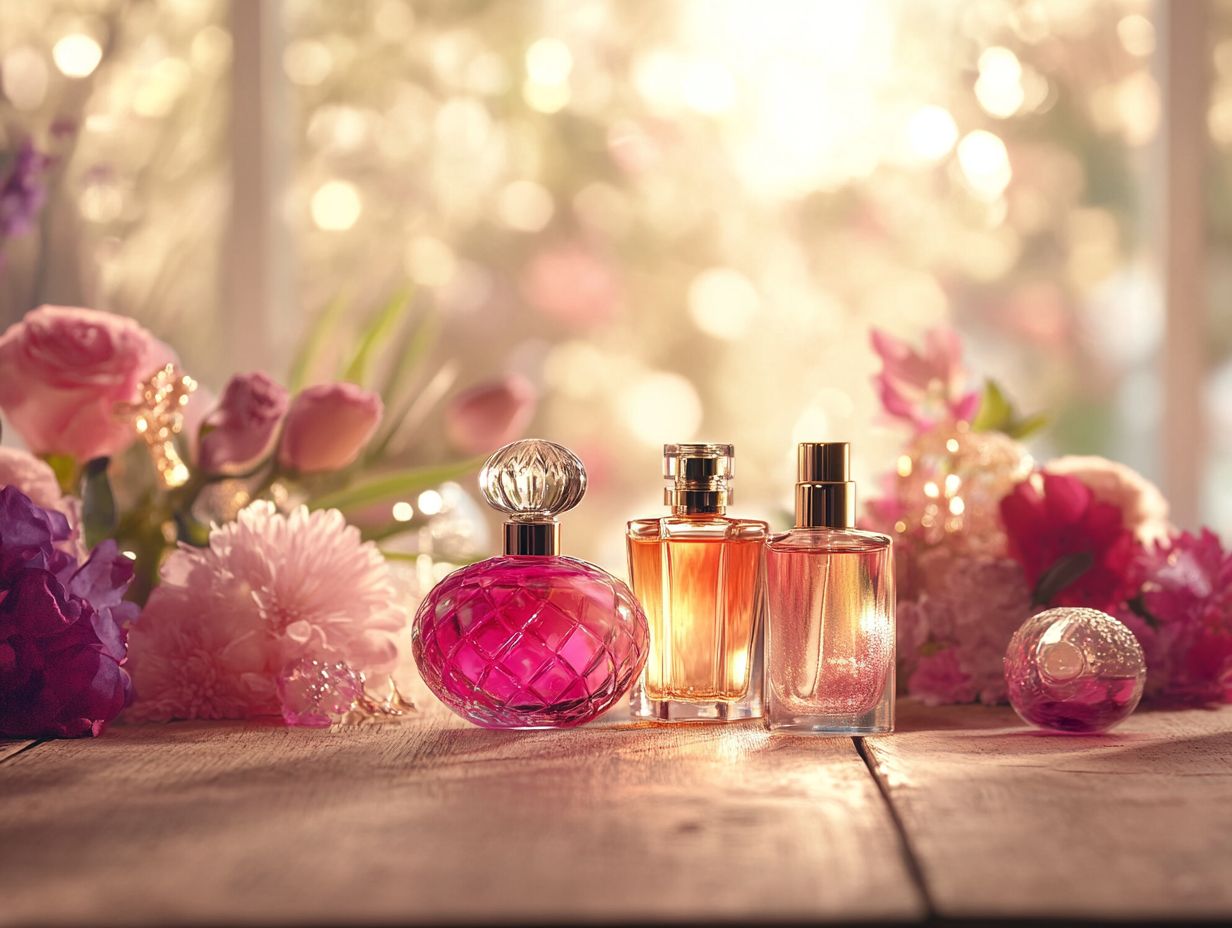
Eau de Parfum generally contains a higher concentration of aromatic components than Eau de Toilette, resulting in a more intense and long-lasting fragrance experience.
This distinction in concentration is essential in determining the appropriate use of each type of perfume. Eau de Toilette, characterized by its lighter formulation, is often preferred for casual daytime wear or in warmer climates due to its refreshing qualities. In contrast, Eau de Parfum is more suitable for evening occasions or cooler weather, as its richer scent profile provides a compelling presence without being overpowering.
The longevity of fragrances differs between the two types, with Eau de Parfum typically lasting on the skin for several hours—often up to eight—while Eau de Toilette has a lifespan of approximately three to five hours.
A clear understanding of these differences can significantly enhance one’s fragrance selection for various occasions.
Tips for Testing and Choosing a Perfume
In the process of testing and selecting a perfume, it is essential to consider several effective strategies to ensure that the chosen fragrance aligns with personal preferences and meets the requirements for various occasions.
How to Properly Test a Perfume
To adequately test a perfume, it is essential to apply the fragrance directly to the skin and allow it to develop over time, as the initial impression may vary significantly from the final scent profile.
When assessing a new fragrance, individuals should apply it to pulse points, such as the wrists or behind the ears, where body heat enhances the fragrance’s notes. It is important to observe how the perfume interacts with one’s unique skin chemistry, as this can substantially affect the overall experience.
It is advisable to allow the scent time to settle, facilitating a comprehensive appreciation of its evolution throughout the day. Noting any changes in the fragrance can provide insight into whether it remains pleasant or becomes overpowering, ultimately informing future purchasing decisions.
Choosing a Perfume for Different Occasions
Selecting a perfume for various occasions necessitates an understanding of individual fragrance preferences, as certain scents can leave a lasting impression in contexts ranging from casual outings to formal events.
For example, a job interview typically requires a more subtle and sophisticated scent that conveys confidence and professionalism without being overpowering. Conversely, a first date may call for a flirtatious and light fragrance that leaves a pleasant and memorable trail.
Furthermore, seasonal celebrations often encourage bolder choices, such as warm and spicy notes during winter festivities or fresh and floral scents for spring gatherings.
By considering the specific context of each occasion, individuals can choose the appropriate fragrance that not only complements their personality but also enhances their presence and charisma.


